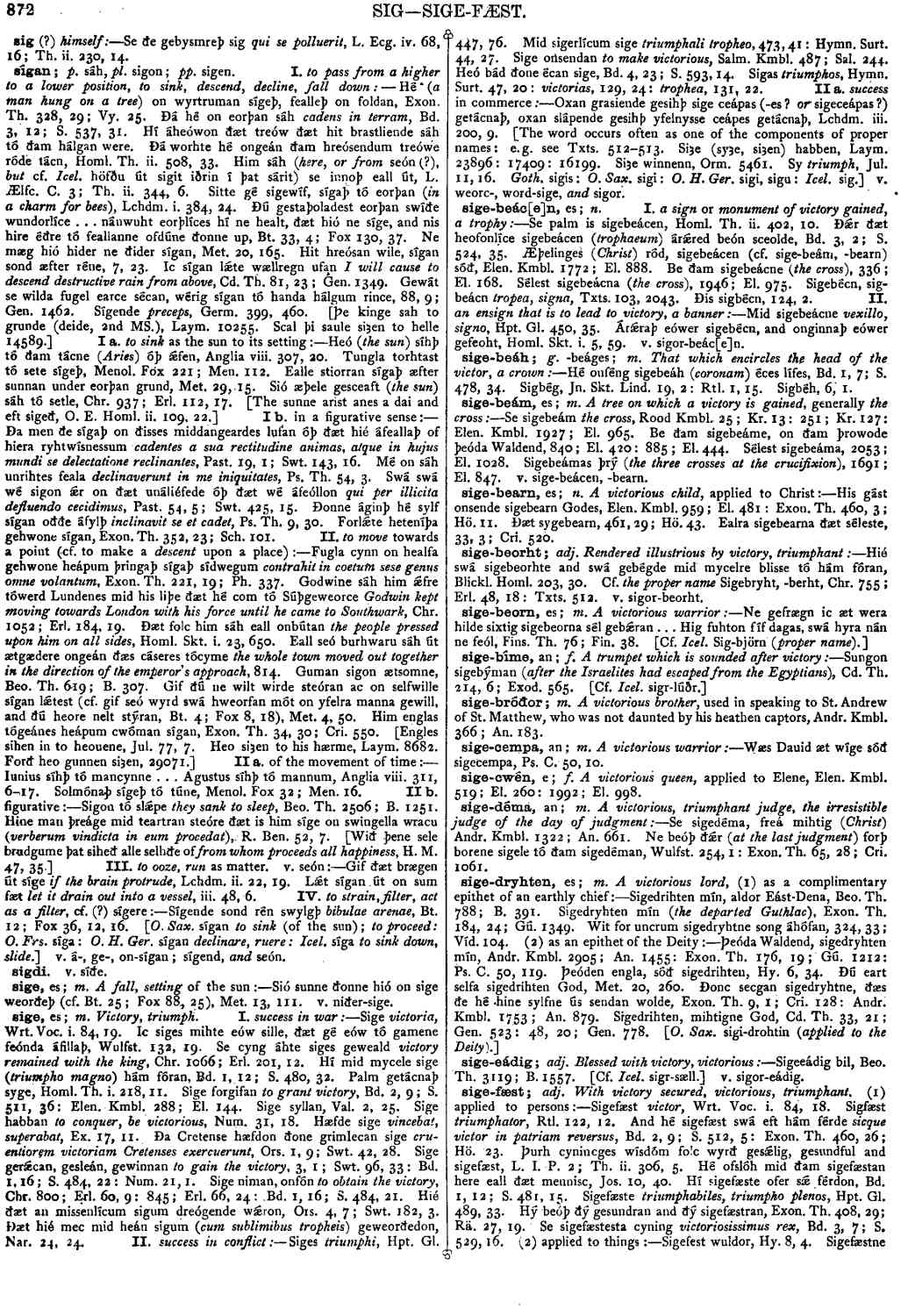sígan
- verb [ strong ]
-
Hé (
a man hung on a tree
) on wyrtruman sígeþ, fealleþ on foldan,- Exon. Th. 328, 29 ; Vy. 25.
-
Ðá hé on eorþan sáh
cadens in terram,
- Bd. 3, 12 ; S. 537, 31.
-
Hí áheówon ðæt treów ðæt hit brastliende sáh tó ðam hálgan were. Ðá worhte hé ongeán ðam hreósendum treówe róde tácn,
- Homl. Th. ii. 508, 33.
-
Him sáh (here, or from seón (?), but cf.
Icel.
höfðu út sigit iðrin í þat sárit) se innoþ eall út,- L. Ælfc. C. 3 ; Th. ii. 344, 6.
-
Sitte gé sigewíf, sígaþ tó eorþan (
in a charm for bees
),- Lchdm. i. 384, 24.
-
Ðú gestaþoladest eorþan swíðe wundorlíce . . . nánwuht eorþlíces hí ne healt, ðæt hió ne síge, and nis hire éðre tó feallanne ofdúne ðonne up,
- Bt. 33, 4 ; Fox 130, 37.
-
Ne mæg hió hider ne ðider sígan,
- Met. 20, 165.
-
Hit hreósan wile, sígan sond æfter réne,
- 7, 23.
-
Ic sígan lǽte wællregn ufan
I will cause to descend destructive rain from above,
- Cd. Th. 81, 23 ; Gen. 1349.
-
Gewát se wilda fugel earce sécan, wérig sígan tó handa hálgum rince,
- 88, 9 ; Gen. 1462.
-
Sígende
preceps,
- Germ. 399, 460. [Þe kinge sah to grunde (deide, 2nd MS.), Laym. 10255.
-
Scal þi saule siȝen to helle 14589.] Ia.
to sink as the sun to its setting :-- Heó (the sun) síhþ tó ðam tácne (Aries )
óþ ǽfen, Anglia viii.- 307, 20.
-
Tungla torhtast tó sete sígeþ,
- Menol. Fox 221 ; Men. 112.
-
Ealle stiorran sígaþ æfter sunnan under eorþan grund,
- Met. 29, 15.
-
Sió æþele gesceaft (the sun) sáh tó setle,
- Chr. 937 ; Erl. 112, 17. [The sunne arist anes a
cadentes a sua rectitudine animas, atque in hujus mundi se delectatione reclinantes,
- Past. 19, 1 ; Swt. 143, 16.
-
Mé on sáh unrihtes feala
declinaverunt in me iniquitates,
- Ps. Th. 54, 3.
-
Swá swá wé sigon ǽr on ðæt unáliéfede óþ ðæt wé áfeóllon
qui per illicita defluendo cecidimus,
- Past. 54, 5 ; Swt. 425, 15.
-
Ðonne áginþ hé sylf sígan oððe áfylþ
inclinavit se et cadet,
- Ps. Th. 9, 30.
-
Forlǽte heteníþa gehwone sígan,
- Exon. Th. 352, 23 ; Sch. 101.
-
Fugla cynn on healfa gehwone heápum þringaþ sígaþ sídwegum
contrahit in coetum sese genus omne volantum,
- Exon. Th. 221, 19 ; Ph. 337.
-
Godwine sáh him ǽfre tówerd Lundenes mid his liþe ðæt hé com tó Súþgeweorce
Godwin kept moving towards London with his force until he came to Southwark,
- Chr. 1052 ; Erl. 184, 19.
-
Ðæt folc him sáh eall onbútan
the people pressed upon him on all sides,
- Homl. Skt. i. 23, 650.
-
Eall seó burhwaru sáh út ætgædere ongeán ðæs cáseres tócyme
the whole town moved out together in the direction of the emperor's approach,
814. - Guman sigon ætsomne. Beo. Th. 619 ; B. 307.
-
Gif ðú ne wilt wirde steóran ac on selfwille sígan lǽtest (cf. gif seó wyrd swá hweorfan mót on yfelra manna gewill, and ðú heore nelt stýran,
- Bt. 4 ; Fox 8, 18), Met. 4, 50.
-
Him englas tógeánes heápum cwóman sígan,
- Exon. Th. 34, 30 ; Cri. 550.
-
Heo siȝen to his hærme,
- Laym. 8682.
- Forð heo gunnen siȝen, 29071.] IIa. of the movement of time :-- Iunius síhþ tó mancynne . . . Agustus síhþ tó mannum, Anglia viii. 311, 6-17.
-
Solmónaþ sígeþ tó túne, Menol. Fox 32 ; Men. 16. IIb. figurative :-- Sigon tó slǽpe
they sank to sleep,
- Beo. Th. 2506 ; B. 1251.
-
Hine man þreáge mid teartran steóre ðæt is him síge on swingella wracu (verberum vindicta in eum procedat), R. Ben. 52, 7. [Wið þene sele brudgume þat siheð alle selhðe of
from whom proceeds all happiness,
- H. M. 47, 35.
-
Gif ðæt brægen út síge
if the brain protrude,
- Lchdm. ii. 22, 19.
-
Lǽt sígan út on sum fæt
let it drain out into a vessel,
iii.- 48, 6.
-
Sígende sond rén swylgþ
bibulae arenae,
- Bt. 12 ; Fox 36, 12, 16.
Bosworth, Joseph. “sígan.” In An Anglo-Saxon Dictionary Online, edited by Thomas Northcote Toller, Christ Sean, and Ondřej Tichy. Prague: Faculty of Arts, Charles University, 2014. https://bosworthtoller.com/27662.
Checked: 0